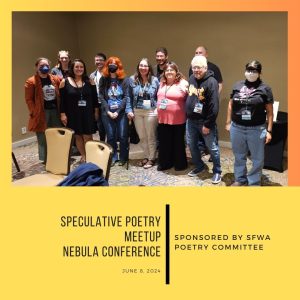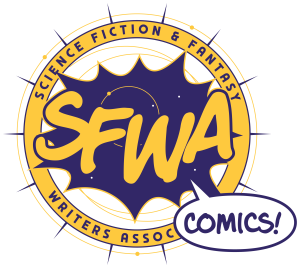by the SFWA Publications Crew in conversation with Jessica Maison, Holly Lyn Walrath, and Wendy Van Camp
Editor’s note: This article is part of the SFWA Presents: Get to Know… series, which includes informational pieces about SFWA programs, committees, and initiatives, and also interviews with the SFWA volunteers who work to support their fellow writers in the industry.
In November 2024, SFWA announced the launch of two new Nebula Awards, one for speculative poetry and one for speculative comics. Eligibility for these awards began in January 2025, with the first awards for these new categories to be presented at the 2026 Nebula Awards Ceremony. For this special edition of The SFWA Blog, we explore the significance of these new awards with the SFWA Comics Committee lead, Jessica Maison, and with Holly Lyn Walrath and Wendy Van Camp, representing SFWA’s Poetry Committee.
Let’s start with the big question:
Why a poetry award, and why a comics award? What traditions and recent trends in SFF are these new prizes celebrating?
Holly Lyn Walrath: I would say that there is a thriving sub-pocket of speculative poetry alive and well today. Similar to the larger SFF community, speculative poetry often does not get the recognition we might wish for in realist or “literary” circles, yet many authors who got their start in, say, an MFA end up publishing speculative poetry, and many realist/literary magazines publish speculative poetry. Speculative poetry is also a central part of the history of SFF. The earliest pulp magazines published poetry—for example, Weird Tales. There is a rich, unexplored past in speculative poetry that most writers are not familiar with, so it’s exciting to see a resurgence in the genre.
Wendy Van Camp: Genre poetry has come a long way. It used to be nearly invisible. As a poet, you’d often have to explain and defend the idea of writing poetry with science fiction or fantasy themes. Now, it has a place at major conventions worldwide. Like filk singers and genre artists, speculative poets have found a welcoming community. This poetry is not only for our fans, but traditional poets are noticing the growing opportunities. Paying markets, an award system for both books and single poems, and recognition as creators are all attractive. Literary poets realize there is a community for their ideas about technology, science, and concepts of the future.
Jessica Maison: Looking back to the first pulp magazines like Amazing Stories, a clear intersection between speculative fiction and comics emerges. Many of the pulps and comics were being published by the same larger publishers and even had some of the same heroes and stories overlap. What the pulps and comics share—besides the serial format—is that there was freedom to push boundaries and the limits of genre. That freedom has expanded tenfold in modern speculative comics, especially from its current independent creators and publishers. Whether a writer and illustrator are adapting and reinterpreting beloved characters from a favorite speculative novel like Frankenstein, or, on the flip side, a writer is adapting a story from a comic for the screen, comics weaves into traditional and emerging SFF industry in ways that push the boundaries of speculative fiction from within its structured panels. Honestly, I’m just excited to be part of it all and to introduce my favorites to as many people as possible.
What brought you to these forms, and what do you love about advancing speculative stories through them?
HLW: I have always written poetry, but it wasn’t until I discovered speculative poetry that I had a lightbulb moment and knew it was what I wanted to write. I’m not sure exactly how I discovered it, but I do remember loving speculative poems I learned about in school, like Beowulf or Christina Rossetti’s “Goblin Market.” There are a few loci from which I write speculative poetry:
- feminist or gender topics, which I find work beautifully with speculative themes
- experimental structures like erasure poetry, where I often erase parts of works by male authors in the SFF canon with the goal of shining a light on the themes included, and
- poems that come from personal experience, where I filter my past through the lens of the speculative.
WVC: I became a speculative poet almost by accident. I was wondering what to do to pass the time until the start of a networking event at a local science fiction convention. Next to me was a sign that said “Scifaiku Workshop.” I ended up taking the class and writing my first poem since high school. After I read the poem out loud to the class, an editor of a poetry journal leaned over and whispered into my ear, “I loved your poem. I want to publish it. I’ll pay you.” This was my start as a micro-poet. Slowly, I switched from being a science fiction novelist to speculative poet and essayist. The themes and stories I told were almost the same as when I wrote novels, but my expression had changed in form. The challenge of writing small with big concepts draws me and keeps me writing.
JM: In my youth, my mother introduced me to speculative fiction and my grandma to comics, and I’m forever grateful to both of them. My love for comics was then super-charged by the titles being put out by Image Comics and many, many other independent creators and publishers that I discovered when I went to my first comic con as an adult. Also, discovering all the amazing middle grade and young adult graphic novels with my daughters opened my eyes even further to the type of incredible speculative stories you could tell in comics. Coming from film, I love to write for other creatives, ones that will take my words and turn them into something visual, whether that is a director or illustrator, so comics was a natural step for me. Finally, the community around independent comics is really special and diverse. It pulled me right in.
Are there other top prizes for speculative comics and poetry, distinct from other genre forms for both mediums?
HLW: For years, the primary awards for speculative poetry took place through the Science Fiction and Fantasy Poetry Association, which was founded in 1978 by speculative poet Suzette Haden Elgin, who was also a linguistics expert and often wrote poetry inspired by that work. Speculative poets have always also had some overlap with literary/realist awards, of which there are too many to name here, but one that comes to mind is the Pulitzer Award, which Tracy K. Smith won in 2012 for Life on Mars, a science fiction adjacent book. In 2025, however, we are seeing the first SFF award recognition for speculative poetry, with both the Nebula Awards and Hugos recognizing poetry.
WVC: Speculative poetry appears on the literary scene quite often. Poems about technology, science, and of the future are becoming more common. I’ve seen Pushcart Prize and Best of the Net nominations for speculative poems regularly. Most of the time, the literary poet doesn’t realize their poem is speculative. This is one reason why the Nebula Award for Poetry is important. The Nebula name lends an air of legitimacy to the concept of genre poetry and brings it more to the forefront of people outside our communities.
JM: There are several awards that comics writers can win for speculative fiction. A graphic novel can win a Hugo Award and a Locus Award and now a Nebula. The top awards in comics are not strictly for speculative fiction, but many of the top titles do fit into the genre. Two big awards that are specific to comics are the Eisner Awards and the Harvey Awards. The Ringo Awards are fun and decided by other comics creators. The Dwayne McDuffie Award recognizes diversity in comics and is a special award. A graphic novel can win a Pulitzer, but that is not the norm. However, Maus did do it.
How long have these Nebula Award proposals been in development, and what stumbling blocks did you face along the way? Was it difficult to define clear parameters for inclusion and exclusion of potential works?
HLW: One of my major goals in joining the Poetry Committee was to get a Nebula Award for poetry, and my primary goal was that it be as inclusive and broad as possible. One thing I’ve witnessed being in the community for about ten years now is that a definition of “not speculative” or “not speculative enough” can be weaponized against marginalized voices, writers from non-Western cultures, writers working in experimental modes, and people writing from a place outside of the often-siloed SFF space.
While we could not change SFWA’s focus on science fiction and fantasy (excluding horror), there were a few pillars of this inclusivity that ended up in the language for the award. The first is that the award would not be limited by word count. When I saw that the Hugo Award requires that a poem be at least three lines, I was delighted we kept this rule because there is a rich tradition of “distich” (two-line) and “monostitch” (one-line) speculative poems. They can be found, for the curious, in the SFPA’s Dwarf Stars Anthology to name one place. Here are a few of my favorites:
I Can’t Help You
Poor moth, I can’t help you.
I can only turn out the light.
—by Ryszard Krynicki
The Cathedral Is
slated for demolition
—by John Ashbery Small
Small poems became a point of discussion in figuring out how to honor poets who write very short poems like haiku and also poets who write epic, book-length poems.
WVC: The Nebula Award proposal was the prime reason our committee formed in March of 2024. The lack of a Nebula for Poetry has been felt keenly by the speculative poetry community for decades. Poets on the committee were excited for the chance to put their ideas in, to edit, or to write the verbiage for the award themselves. Working on the proposal was a true team effort. Everyone on the committee played a part in its formation.

Our original proposal writers tended to be epic poets and at first, the wording favored longer poems for the award. I felt a need to bring micro-poetry into the mix. I specialize in scifaiku, science fiction themed haiku poetry, and I wanted to make sure my fellow haiku poets had a small shot at winning a Nebula in the future. This is one reason why we don’t have a minimum line limit for the Nebula Award. Thankfully, others in the group agreed with me and we rewrote the proposal to be more inclusive.
JM: The comics committee formed in 2020 to usher in a process to welcome comics writers and solo illustrators as members. At that time, Ben Wilgus was our first chair and helped steer the survey process that would determine how comics creators would be accepted into membership. Monica Valentinelli, then Jordan Kurella were the board liaisons for that part of the process. Tim Susman and I were the other founding committee members. I took over as chair after that process, and Ben stayed on as a member. The committee then worked with the board to determine how comics would qualify for a Nebula. They have technically qualified for the last two years in the short story, novelette, novella, and novel categories based on page count.
However, the comics committee felt strongly that comics still needed and deserved its own category, maybe even two in the future. Anthony Eichenlaub has been a constant support as our board liaison through the entire Nebula process. Madeleine Holly-Rosing and A.A. Rubin joined the committee and helped finish the final steps in 2024 in collaboration with the Nebula Committee and the board. We are so thrilled that the collective and steady work paid off and that comics published in 2025 can qualify for the first-ever Nebula Award for comics.
Everything’s a work in process, so what do you anticipate as important next steps for cultivating a robust and competitive field for Comics and Poetry in the coming years?
HLW: One of the main goals going forward will be to find a way to honor poetry books. Currently, there is no Nebula Award for poetry books, and there is also no Nebula Award for anthologies (which would include poetry anthologies of more than one author). I think this is the next step in recognizing poetry as a valid art form that authors can publish. There are many valuable presses publishing speculative poetry books, including Raw Dog Screaming Press, Aqueduct Press, and Neon Hemlock Press, just to name a few. Without a thriving book community, speculative poetry exists primarily online, in anthologies, and in magazines. But there is something special about seeing an author’s work collected.
WVC: I would like to see a permanent Hugo Award for Poetry as a next step. Seattle WorldCon is offering a one-time Hugo for Poetry. I’ve been in talks here in Los Angeles about doing the same with our upcoming WorldCon the following year. If we can see two years in a row with a Hugo for Poetry, it could be a final step in making the Hugo a regular honor for our community.
As an anthology editor, I feel the lack of awards for poetry anthologies. Imaginarium Convention offers one and there is an anthology category at the Critters Readers Poll, but little more. Having a Nebula for anthologies would be an incredible step forward.
JM: We want to grow our community. The Comics Committee just welcomed our newest member, Adam Barnhardt, and hopes to continue growing so our work can expand. The team is putting together programming that introduces the entire membership to comics in a detailed and immersive way. We will continue hosting monthly comics chats that build community as well as provide resources from comics experts. We are putting together an introductory series for The SFWA Blog and are working to have a presence/table at several of the larger comic-cons to introduce comics creators to SFWA while showcasing our members’ work.
I think it is critical to raise awareness for the new Nebula with comics creators and publishers and to get the industry excited about the potential to be part of the awards and SFWA. Hopefully, that all translates to more members who participate in SFWA and attend the Nebulas. With those goals in mind, we’ve had a SFWA comics logo designed by Metal Ninja Studios. Members should keep an eye out for it when looking for our programming and events.
Where can people learn more about speculative comics and poetry, both as new entrants to the fields and more seasoned creators looking for professional growth?
HLW: Committee member Casey Aimer is currently spearheading the creation of a guide on the SFWA website for poets called Speculative Poetry 101. We are looking for SFWA members who would like to contribute. The guide will be similar to the “Indie Pub 101” guide and cover topics such as marketing, self-promotion, performance poetry, and more.
We are also working on a series for The SFWA Blog, which we hope will cover valuable topics in speculative poetry. Currently, the series will be written by committee members, but we welcome anyone interested in participating. We are also always open to new members, so if anyone is interested in helping out, they can let us know!
WVC: If you are new to speculative poetry, I would recommend reading examples of work. Most of our genre’s pro magazines include speculative poetry from top names in the field. The Science Fiction & Fantasy Poetry Association has a free-to-read online journal called Eye to the Telescope, which includes plenty of quality speculative poetry. Another free resource is Starship Sloane’s speculative online journals. The Starlight Scifaiku Review, The Space Cadet Science Fiction Review, The Flying Saucer Poetry Review, and his newest Dreadnought SF are filled with examples of speculative poetry.
Our new poetry resource in the SFWA Wiki is a great way to learn the basics of the craft. Our committee member Casey Amir has been hard at work coordinating this project, from organizing the topics to writing sections or finding writers to take on topics. It has become an inclusive and powerful resource for poets and will only improve in time.
For more experienced poets, there is a market list of speculative journals at the SFPA to find your way to the more popular magazines. Networking or attending readings of poets on the convention scene is always a good idea.
Speaking of networking, our Poetry Committee sponsors a quarterly poetry open-mic series you can attend for free if you are a member of SFWA. We feature an established poet who will be recorded on our event page and offer you a chance to bring your own poetry to read or simply to listen to others. It can be a good way to meet and network with SFWA-based speculative poets.
Our Poetry Committee (poetry@sfwa.org) also offers a quarterly club to talk about poetry chapbooks. It is hosted by Poetry Grandmaster Mary Soon Lee. Space is limited. It is advised to contact Mary first to see if there is a spot for you. Check the SFWA events page to see when the next open mic or book club is happening. Both are via Zoom and at a time convenient for either the United States or Europe.
JM: If you are new to comics, I suggest diving in and reading some celebrated speculative fiction graphic novels. A good place to start is checking out the past winners of some of the awards I mentioned earlier. Also, attend a local comic-con and explore both the artist alley and small press sections. Go to your local comic book shop and ask them for some suggestions. Connecting with other comics creators here at SFWA is also beneficial. Members can attend one of our monthly chats or find us on the SFWA Discord or boards. We discuss our current favorites, SFWA members’ comics, and other comics-related topics. We also host experts to give special presentations on a variety of comics-related topics during these chats.
Any SFWA member or Nebula conference attendee can attend the chats or view recordings of past expert presentations with topics that range from traditional publishing to crowdfunding. As we continue to expand this year, we’ll be offering more ways and opportunities for members to network around comics so folks should keep an eye out for those listings. Members should feel free to email comics@sfwa.org with any questions, to get comics recommendations, learn about events, or get involved.

The SFWA Blog looks forward to hosting more articles on speculative comics and poetry. Thank you to both committees for taking the time to talk to us about your volunteer work at SFWA!
 Jessica Maison is a sci-fi, fantasy, and horror author, screenwriter, and comic creator. Plastic Girl is her coming-of-age ecopunk YA novel series set in a climate apocalypse. She is the writer of the award-winning graphic novel series, Mary Shelley’s School for Monsters, and her short comics have been featured in anthologies such as Cthulhu Is Hard to Spell and Nightmare Theater. She is an IBPA Benjamin Franklin Gold Award winner and Foreword INDIES Award nominee. Her sci-fi speculative short stories have been published by Terraform, and she is the founder of Wicked Tree Press.
Jessica Maison is a sci-fi, fantasy, and horror author, screenwriter, and comic creator. Plastic Girl is her coming-of-age ecopunk YA novel series set in a climate apocalypse. She is the writer of the award-winning graphic novel series, Mary Shelley’s School for Monsters, and her short comics have been featured in anthologies such as Cthulhu Is Hard to Spell and Nightmare Theater. She is an IBPA Benjamin Franklin Gold Award winner and Foreword INDIES Award nominee. Her sci-fi speculative short stories have been published by Terraform, and she is the founder of Wicked Tree Press.
 Wendy Van Camp, Anaheim’s Poet Laureate Emerita, is a dynamic voice in speculative poetry, blending cutting-edge technology, astronomy, and daydreams. Her talent has earned her nominations for the Elgin, Pushcart Prize, Rhysling, and Dwarf Stars Award. Wendy’s poems, stories, and articles grace journals worldwide such as Star*Line, Scifaikuest, and San Diego Poetry Annual. She regularly contributes to Indy Author Magazine as a contracted writer. An active podcaster, you can see Wendy as a panelist on the “Con-Tinual” stable of podcasts Fandom and The Panel Room. You can hear her on her own audio podcast No Wasted Ink Ramblecast. As a member of SFWA, SFPA, and IBPA, Wendy is a passionate advocate for the speculative community. Her debut poetry collection, The Planets, was nominated for the Elgin. Discover more about Wendy and her writing coach services at wendyvancamp.com.
Wendy Van Camp, Anaheim’s Poet Laureate Emerita, is a dynamic voice in speculative poetry, blending cutting-edge technology, astronomy, and daydreams. Her talent has earned her nominations for the Elgin, Pushcart Prize, Rhysling, and Dwarf Stars Award. Wendy’s poems, stories, and articles grace journals worldwide such as Star*Line, Scifaikuest, and San Diego Poetry Annual. She regularly contributes to Indy Author Magazine as a contracted writer. An active podcaster, you can see Wendy as a panelist on the “Con-Tinual” stable of podcasts Fandom and The Panel Room. You can hear her on her own audio podcast No Wasted Ink Ramblecast. As a member of SFWA, SFPA, and IBPA, Wendy is a passionate advocate for the speculative community. Her debut poetry collection, The Planets, was nominated for the Elgin. Discover more about Wendy and her writing coach services at wendyvancamp.com.
 Holly Lyn Walrath is a writer, editor, and publisher. Her poetry and short fiction has appeared in Strange Horizons, Fireside Fiction, Analog, and Flash Fiction Online. She is the author of several books of poetry including Glimmerglass Girl, The Smallest of Bones, and Numinous Stones. She holds a B.A. in English from The University of Texas and a Master’s in Creative Writing from the University of Denver. In 2019, she launched Interstellar Flight Press, an indie SFF publisher dedicated to publishing underrepresented genres and voices.
Holly Lyn Walrath is a writer, editor, and publisher. Her poetry and short fiction has appeared in Strange Horizons, Fireside Fiction, Analog, and Flash Fiction Online. She is the author of several books of poetry including Glimmerglass Girl, The Smallest of Bones, and Numinous Stones. She holds a B.A. in English from The University of Texas and a Master’s in Creative Writing from the University of Denver. In 2019, she launched Interstellar Flight Press, an indie SFF publisher dedicated to publishing underrepresented genres and voices.

